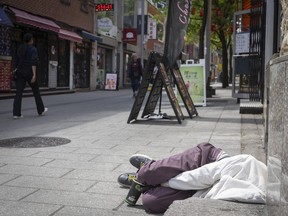There are three major flaws: lack of data on funding and services; invisibility of the English-speaking unhoused’s needs; and inadequate emphasis on the impacts for residents, workers and merchants.

The OCPM’s document has three major flaws: lack of data on funding and services; invisibility of the English-speaking unhoused’s needs; and inadequate emphasis on the impacts of homelessness and public safety on Montrealers.
The OCPM cites relevant data from a 2023 Quebec Health and Social Services Ministry survey concerning 4,690 unhoused people in Montreal: 59 per cent have mental health issues, 54 per cent have substance abuse needs and 45 per cent have physical illnesses or medical conditions. In terms of diversity, 29 per cent are women, 20 per cent are immigrants and refugees; 16 per cent are LGBTQ2+ and 12 per cent are Black.
Two other pieces of data require attention. First, while Indigenous people make up approximately 0.9 per cent of the city’s population, 13 per cent of the unhoused are Indigenous. Second, a large amount — 24 per cent — of the unhoused are individuals who make the transition from the youth protection system to independent living at the age of 18.
The first flaw in the document is the lack of specific data on current budgets and services for the unhoused, other than mentioning that, as of September, there are approximately 30 emergency and transitional housing services spread across 10 boroughs for a total of around 1,500 beds, while historically such services were concentrated in the downtown area.
Important questions remain: How much money has been spent on the unhoused in the last four years? Where is the money going to? What services are offered for the unhoused with mental health issues and drug addiction? Is more housing the only solution? Are resources reaching the unhoused instead of benefiting the bureaucracy?
The second flaw is the lack of data on the English-speaking unhoused. One can assume most Indigenous unhoused people and youths transitioning from the Batshaw Youth and Family Centres are English-speaking. Are the English-speaking unhoused’s needs adequately served? Like gender and mental health, language should be a key factor for homelessness policies.
In the next two months, the OCPM will hold three “citizens’ conversation” forums and one information session, primarily in French, at UQAM and in the Sud-Ouest and Ahuntsic boroughs. This may discourage English-speaking Montrealers from participating. Almost 15 years ago, the city made the same errors by omitting English-speaking seniors from consultations on an action plan for seniors. A session in English, to be held in the west end of Montreal, should be added.
A policy on cohabitation requires early and full inclusion of all residents in the difficult conversation, before decisions are made from above.
Fo Niemi is the executive director of the Center for Research-Action on Race Relations.